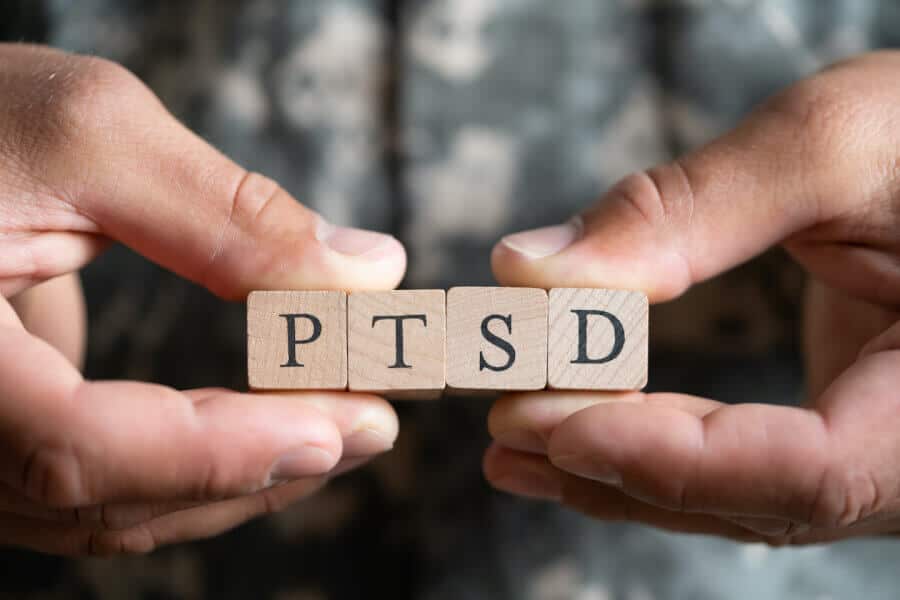Post-Traumatic Stress Disorder or PTSD, is a severe mental health condition that can develop after experiencing or witnessing a traumatic event.
These events can range from natural disasters, accidents, and combat exposure to physical or sexual assault. PTSD affects millions of people worldwide, impacting their daily lives, relationships, and overall well-being.
This mental illness can also be found among soldiers after witnessing horrible battles and traumatic near-death experiences. Understanding and managing PTSD are crucial steps towards recovery and improving quality of life.
Symptoms of PTSD
PTSD symptoms can vary in intensity and may appear immediately after the traumatic event or even years later. They are typically grouped into four categories:
1. Intrusive Memories:
– Recurrent, unwanted memories of the traumatic event
– Flashbacks or reliving the traumatic event as if it were happening again
– Nightmares about the traumatic event
– Severe emotional anguish or physical reactions to reminders of the trauma
2. Avoidance:
– Avoiding places, activities, or people that remind you of the traumatic event
– Avoiding thoughts or feelings related to the traumatic event
3. Negative Changes in Thinking and Mood:
– Negative thoughts about yourself, others, or the world
– Hopelessness about the future
– Memory problems, including not remembering important aspects of the traumatic event
– Difficulty maintaining close relationships
– Feeling detached from family and friends
– Lack of interest in activities you once enjoyed
– Difficulty experiencing positive emotions
– Emotional numbness
4. Changes in Physical and Emotional Reactions:
– Being easily startled or frightened
– Always being on guard for danger
– Self-destructive behavior, such as drinking too much or driving too fast
– Trouble sleeping
– Trouble concentrating
– Irritability, angry outbursts, or aggressive behavior
– Overwhelming guilt or shame
Causes and Risk Factors
PTSD can develop at any age, and various factors can increase the risk of developing PTSD, including:
– Severity and Proximity: The more severe and closer you are to the trauma, the higher the risk.
– Previous Trauma: Having experienced trauma before increases the likelihood of developing PTSD after another traumatic event.
– Mental Health History: A history of mental health issues, such as anxiety or depression, can increase the risk.
– Support System: Lack of a strong support system can make it more challenging to cope with trauma and increase the risk of PTSD.
– Additional Stress: Experiencing additional stress after the traumatic event, such as losing a loved one or experiencing other significant life changes, can contribute to PTSD.
Managing PTSD
While PTSD can be a challenging condition to manage, several effective treatments and coping strategies can help individuals lead fulfilling lives. Here are some key approaches:
Professional Therapy
– Cognitive Behavioral Therapy (CBT): CBT is one of the most effective treatments for PTSD. It involves working with a therapist to identify and change negative thought patterns and behaviors associated with the trauma.
– Exposure Therapy: This type of therapy helps individuals face and control their fears by gradually exposing them to trauma-related thoughts and feelings in a safe environment.
– Eye Movement Desensitization and Reprocessing (EMDR): EMDR combines exposure therapy with guided eye movements to help individuals process and integrate traumatic memories.
Medication
Medications can be an essential part of PTSD treatment, particularly for managing symptoms such as anxiety, depression, and sleep disturbances. Common medications include:
– Antidepressants: Such as selective serotonin reuptake inhibitors (SSRIs) and serotonin-norepinephrine reuptake inhibitors (SNRIs).
– Anti-anxiety Medications: These can help reduce severe anxiety and panic attacks.
– Prazosin: Often used to treat nightmares related to PTSD.
Self-Care and Coping Strategies
– Healthy Lifestyle: Maintaining a healthy diet, regular exercise, and sufficient sleep can significantly impact overall well-being and help manage PTSD symptoms.
– Mindfulness and Relaxation Techniques: Practices such as meditation, yoga, and deep breathing exercises can reduce stress and promote emotional regulation.
– Support Groups: Connecting with others who have experienced similar trauma can provide a sense of community and reduce feelings of isolation.
– Limit Alcohol and Drugs: Avoiding alcohol and recreational drugs can prevent exacerbating symptoms and promote healthier coping mechanisms.
– Journaling: Writing about your thoughts and feelings can help process emotions and gain insights into your experiences.
Building a Strong Support System
Having a strong support system of family, friends, and mental health professionals can provide emotional support and practical assistance. Open communication about your experiences and needs is crucial for receiving the support necessary for recovery.
Read more: Mindfulness and Meditation: Tools for Mental Wellness
Seek Professional Conseltation
Understanding and managing PTSD is a vital step towards healing and improving one’s quality of life.
While PTSD is a complex and challenging condition, effective treatments and coping strategies can significantly reduce symptoms and help individuals regain control over their lives.
Seeking professional help, adopting healthy lifestyle habits, and building a strong support system are critical components of managing PTSD. With the right approach and support, it is possible to move forward and lead a fulfilling life despite the challenges posed by PTSD.
Contact us at: (469) 269-0080 or send an email here: [email protected] and we’ll be happy to guide you through your journey.







